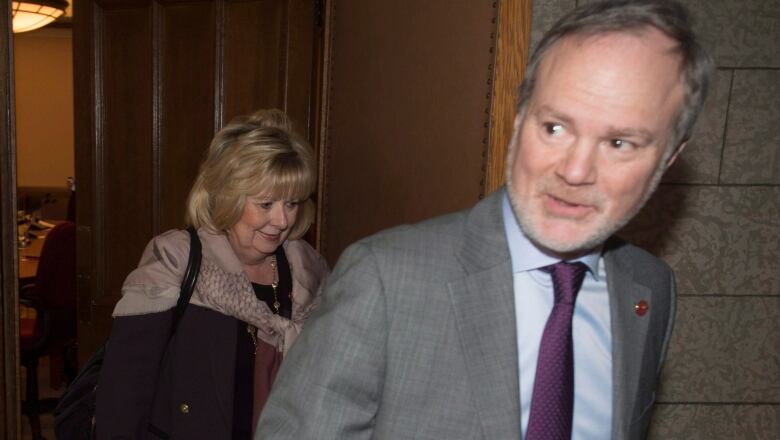Calls to organize Senate along regional lines instead of by political party
After Trudeau appoints 21 senators this fall, Independents will be the largest group in Red Chamber

The Liberal government's representative in the Senate says hewants tosee members of the Red Chamber organized by region, rather than along traditional party lines, a move he says is necessary with Independents poised to become the biggest group in theupper house.
"I think that we may go through a period of some experimentation. I, myself, am biased to the notion of regional divisions for organizational purposes and leaving open a wider number of groups for affinity around policy or other associations," SenatorPeter Harder said in an interview with CBC Radio'sThe House.
"But the reality is thatduopolyof control that the parties have enjoyed in the Senateis over."
I fear those regional caucuses would become powerful instruments.- Independent Quebec Senator Andr Pratte
The Ontario Independentsenator, who led the Trudeau government's transition team after the last election, said that the imminent influx of new senators will make the current situation untenable.
Two well-respected former senators, ToryHugh Segal and LiberalMichael Kirby, recently penned a report also suggestingareorganizationaway from political parties and into regional caucuses, each to be headed by a "convener"and "deputy convener."
"I certainlywould suggest that be looked at seriously there are other ways of identifying groups than party identification," Harder told host Chris Hall.
- Coming to a TV near you: The Senate, if senators agree
- Senate 'should admit it made a mistake' on expense cases, ex-senator Hugh Segal says
- Senators say losing Atlantic Canada's Supreme Court spot 'undermines' Canada
- Senate considering outside oversight of expense claims
Non-affiliated senators do not have access to thesame resources as their colleagues in the party caucuses namely a substantialresearch budget and they have trouble sitting on the committees of their choice, because membership is determined byparty leadership.

Harder said that each Liberal senatorhasroughly $20,000 for research, whereas Independents have less than $7,000. While Independents now form 27 per cent of the current complement, they only have 17 per cent of the seats on Senate committees.
The Senate's modernization committee recommended this week that the upper house expand the definition of "caucus" to include groups of nine or more senators "formedfor a parliamentary purpose," to solve some of the current inequities faced byIndependent senators.
That report also recommended allowing TV cameras in the chamber, and changing the rules around how the Senate Speakeris selected.
Prime Minister Justin Trudeauwillfill the current 21 seat vacancies this fall, bringing the number of Independents to 44 members in the 105-seat upper house. (The Conservatives have 40 seatsand the Liberals have 21.)
'Hurtful for the country'
There has been some resistance to Harder's proposal to organizealong regional lines, with some senators fearing it could lead to a chamber where different parts of the country are pitted against one another.
"I fear those regional caucuses would become powerful instruments, and, I think, possiblyhurtful for the country," Independent Quebec Senator Andr Pratte said at a recent committee meeting.
"They would also be subject to powerful pressures by provincial governments and regional lobbies of all sorts, who would expect that regional caucuses would vote on bills on a basis of regional solidarity."

Conservative Nova Scotia Senator Stephen Greene also flagged his unease with regional divisions. "The Senate is a national institution, a federal one, and most of us, I think, tend to vote along the lines of what is best in the national interest, and I think that's key.I do worry that if regional caucuses are created and expand their role, that some of us, anyway, will stop doing that, and I think that's wrong."
Quebec Liberal Senator Serge Joyal said there is a possibility this setup could fan the flames of Quebec nationalism, and shirking the national nature of the chamber could lead to parochialism. "That would be totally contrary to the nature of this country and where regional tensions are so strong."
The Constitution divides Canada into four areas for Senate purposes, with an equal number of seats:24 for Ontario, 24 for Quebec, 24 for theMaritime provinces(10 each forNova ScotiaandNew Brunswick, and four forPrince Edward Island), and 24 for thewestern provinces(six each forManitoba, British Columbia,Saskatchewan, andAlberta).
Newfoundland and Labrador, which became a province in 1949, has six seats to its name but is not officially part of any one region, although it naturally follows it would likely align with its fellow Atlantic provinces, thereby giving the four provinces more seats than any other region.












_(720p).jpg)


 OFFICIAL HD MUSIC VIDEO.jpg)
.jpg)



























































































